Between Monday 4 April and Sunday 5 June these new courses will be free for everyone and will remain free for Ukrainians and people in LMIC settings.
One of the most important factors in rehabilitation is the impact of contextual factors, including the overall context in which rehabilitation takes place. We know that the environment is known to have a significant impact on treatment generally. Therefore, the circumstances surrounding rehabilitation, from the situation before, during and after the event leading to a loss in function, are all important factors to consider throughout the rehabilitation process. The context in which rehabilitation occurs also greatly influences the range and availability of rehabilitation services and their utilisation.
Our new courses aims to equip rehabilitation professionals with a comprehensive knowledge of rehabilitation within the context of disaster and conflict situations, so that they can play an effective role in providing quality early rehabilitation that goes beyond life-and-limb-saving to deliver care that maximises functional outcomes.
Sign Up For Free Today
Instructors
Funded by the United States Agency for International Development (USAID), the Learning, Acting and Building for Rehabilitation in Health Systems Consortium (ReLAB-HS) is a global project that will support the development of health systems that are responsive to the growing needs for rehabilitation within populations. It seeks to co-design and implement innovative, comprehensive, cost-effective interventions that strengthen health systems for the provision of rehabilitation, including assistive technology.
ReLAB-HS is made possible by the generous support of the American people through the United States Agency for International Development (USAID) and is implemented under cooperative agreement number 7200AA20CA00033. The consortium is managed by the prime recipient, Johns Hopkins Bloomberg School of Public Health.

Courses
Introduction to Rehabilitation in Disaster and Conflict Situations
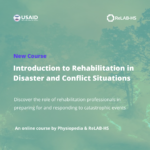
Rehabilitation professionals have played a role in responding to disasters and conflicts throughout history. The care needs generated by various global events have been intertwined with the development of many rehabilitation professions. This course will explore what conflicts and disasters are, the role of early rehabilitation and the rehabilitation professional.
Learn The Role of Clinicians in Disaster Situations
Challenges in Delivering Rehabilitation in Disasters and Conflicts
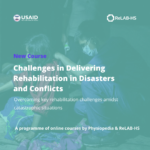
Conflicts and disasters create multiple challenges that vary according to the context, severity and acuity of the emergency. Health services can be overwhelmed and are often unable to deliver safe and effective rehabilitation care. This course will explore some of the key challenges when delivering rehabilitation in disasters and conflicts.
Provide Rehab Despite Catastrophe
Assessment and Treatment Considerations in Disasters and Conflicts
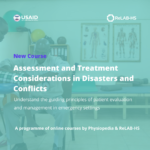
Rehabilitation professionals working in disaster and conflict zones face unique challenges associated with complex trauma, injury surge and resource scarcity that many have never encountered before. This course will examine assessment and treatment considerations and highlight some of the common complications seen in disaster and conflict settings.
Understand The Guiding Principles of Patient Management in Emergencies
Rehabilitation of Fractures in Disasters and Conflicts
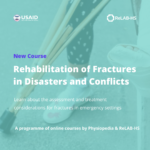
Fracture rehabilitation in conflicts and disasters is frequently complicated as patients often present with complex poly-trauma. Complications can even occur alongside simple fractures. This course will examine the assessment and treatment considerations for fractures and highlight some of the common complications seen in disaster and conflict settings.
Learn The New Considerations of Fracture Management
Rehabilitation of Burns in Disasters and Conflicts
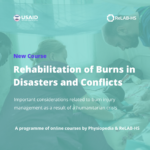
Burns presentations in conflicts and disasters often reflect those commonly seen in industrial or domestic burns and require a similar management approach. However, in the case of burns following conflict / blast injuries, more complex, combined trauma would be expected. This course will examine the assessment and treatment considerations for burns and highlight some of the common complications and challenges for management seen in disaster and conflict settings.
Improve Your Understanding of Burns Management
Rehabilitation of Spinal Cord Injury in Disasters and Conflicts
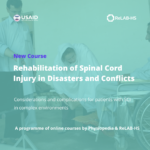
Spinal cord injuries are commonly seen following disasters and conflicts. They are associated with a high risk of complications due to delayed transfer to specialist centres, especially in low resource settings where pre-existing spinal cord injury services are often minimal. This course will examine the assessment and treatment considerations for people with spinal cord injuries and highlight some of the common complications seen in disaster and conflict settings.
Understand Considerations of SCI Management in Disaster Settings
Rehabilitation of Acquired Brain Injury in Disasters and Conflicts
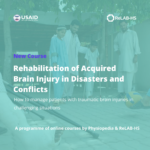
In conflicts and disasters, rehabilitation professionals are likely to see different types of acquired brain injuries ranging from mild impairment to very severe impairment. An acquired / traumatic brain injury is the leading cause of death and disability within these contexts. An acquired brain injury in a disaster and conflict situation can be due to traumatic or non-traumatic causes. This course will examine the principle assessment and treatment considerations for acquired brain injury and highlight some of the common complications seen in disaster and conflict settings.
Manage Brain Injuries in Tricky Settings
Rehabilitation of Amputations in Disasters and Conflicts
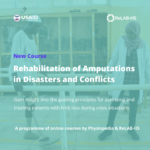
Amputations are common in both disasters and conflicts, but they occur for different reasons. In disasters, limb amputation often occurs as a result of crush injuries, while in conflicts they are generally weapon-related injuries. This course will explore the general indications for amputation and highlight the assessment and treatment considerations pre- and post-amputation. It will also highlight some common complications seen in disaster and conflict settings.
Learn The Guiding Principles of Amputee Rehab During Crisis








